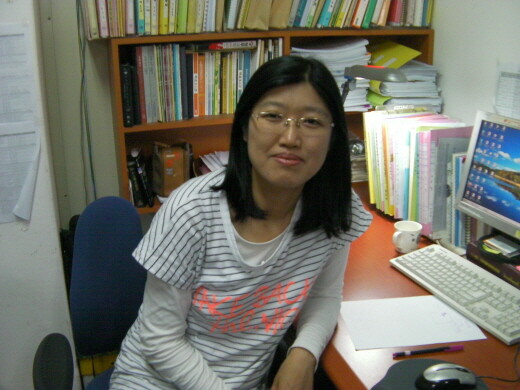hankyoreh
Links to other country sites 다른 나라 사이트 링크
Banollim leader continues struggle against Samsung

By Kim Min-kyeong
She graduated in 1998 and began a part-time job at a department store. She took a position previously filled by a regular worker, standing all to sell goods. Then she looked at the Labor Standards Law. The working conditions did not match the law. Feeling she needed to learn more, she studied and in 2002 passed the test to become a certified labor attorney. That is how Lee Jeong-ran, 34, became a labor attorney.
Serving for eight years as a legal support volunteer for the Korea Confederation of Trade Unions (KCTU), she has for the last three years taken on the world’s largest semiconductor producer, Samsung Electronics, to lead Banollim, a civic organization that advocates for the health and human rights of workers in the semiconductor industry.
This is not the first time she has dealt with a no-union company like Samsung. In early 2004, while she was working at the KCTU’s Gyeonggi Province branch, the cashiers at the Suji, Yongin branch of Emart came to her looking to form a union. Accordingly, in summer of that year, she was hired as a cashier. When they tried to form a union in December, the company was turned inside out. It called in, one-by-one, each of the 23 union members and advised them to leave the union. It did not renew the contracts of the three that held out to the end. She knew of Samsung family’s no-union policy, but she wondered if things were also the same at Shinsegae Department Store which is the member of Samsung family. She had experienced the true nature of no-union companies. The union members fought for three more years.
Since then, whenever requests for counsel regarding Samsung come in, she usually takes them. In July 2007, she met Hwang Sang-ki, 55, who lost his daughter Yu-mi to acute leukemia while she was working at Samsung Electronics’ semiconductor factory in Giheung. She formed Banollim with other individuals invested in the cause. Not knowing a great deal about either leukemia or semiconductors, she learned as she struggled.
Last December, she was arrested by police on charges of violating protest laws by holding a memorial to mark the fourth anniversary of the death of Hwang Min-ung, a Samsung employee who died of leukemia. The families of the victims that formed Banollim, however, were a source of strength.
“Nothing is simple in this work,” Lee said. “Even if it is difficult, if you must do it, you do it.”
Samsung has never directly contacted her, but she said efforts to appease the victims continue. Those who fell ill with leukemia while working at Samsung semiconductor factories and their families testified that Samsung offered money in exchange for the families’ agreement not to report their illness as an industrial accidents or contact civic organizations.
Banollim has mobilized every means possible, including testimonials, registering industrial accidents, international petition drives and protests, but applications to report the illnesses as industrial accidents have been returned and Samsung has continued to deny a direct connection between leukemia and the work environment.
Samsung Electronics said Thursday that it would conduct a complete reinvestigation of its semiconductor production lines. This was virtually the first response issued by Samsung, which has kept silent. Lee said she does not expect much, however, and doubts their sincerity.
In July, she has been concentrating on a month-long campaign to protect the health and human rights of semiconductor factory workers, traveling around semiconductor factories to host public relations events and hold memorial ceremonies. Banollim has learned of at least nine Samsung Electronics semiconductor workers who have died from leukemia.
Please direct questions or comments to [englishhani@hani.co.kr]
Editorial・opinion
![[Editorial] Does Yoon think the Korean public is wrong? [Editorial] Does Yoon think the Korean public is wrong?](https://flexible.img.hani.co.kr/flexible/normal/500/300/imgdb/original/2024/0417/8517133419684774.jpg) [Editorial] Does Yoon think the Korean public is wrong?
[Editorial] Does Yoon think the Korean public is wrong?![[Editorial] As it bolsters its alliance with US, Japan must be accountable for past [Editorial] As it bolsters its alliance with US, Japan must be accountable for past](https://flexible.img.hani.co.kr/flexible/normal/500/300/imgdb/original/2024/0417/6817133413968321.jpg) [Editorial] As it bolsters its alliance with US, Japan must be accountable for past
[Editorial] As it bolsters its alliance with US, Japan must be accountable for past- [Guest essay] Amending the Constitution is Yoon’s key to leaving office in public’s good graces
- [Editorial] 10 years on, lessons of Sewol tragedy must never be forgotten
- [Column] A death blow to Korea’s prosecutor politics
- [Correspondent’s column] The US and the end of Japanese pacifism
- [Guest essay] How Korea turned its trainee doctors into monsters
- [Guest essay] As someone who helped forge Seoul-Moscow ties, their status today troubles me
- [Editorial] Koreans sent a loud and clear message to Yoon
- [Column] In Korea’s midterm elections, it’s time for accountability
Most viewed articles
- 1[Column] The clock is ticking for Korea’s first lady
- 2Samsung barricades office as unionized workers strike for better conditions
- 3[Editorial] When the choice is kids or career, Korea will never overcome birth rate woes
- 4[News analysis] After elections, prosecutorial reform will likely make legislative agenda
- 5Why Israel isn’t hitting Iran with immediate retaliation
- 6S. Korea, Japan reaffirm commitment to strengthening trilateral ties with US
- 7[Editorial] Does Yoon think the Korean public is wrong?
- 8[Guest essay] How Korea turned its trainee doctors into monsters
- 9[Editorial] 10 years on, lessons of Sewol tragedy must never be forgotten
- 10Strong dollar isn’t all that’s pushing won exchange rate into to 1,400 range